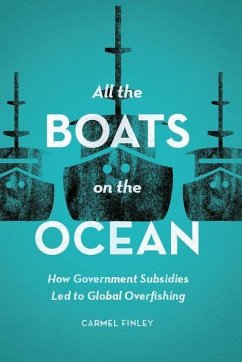Most current fishing practices are not sustainable, either biologically or economically. Much of the fish that have been caught were discarded and wasted. Globally, countries spend $80 billion buying fish that cost $105 billion dollars to catch. At the same time, continued heavy fishing places more pressure on stocks as they contend with a warmer and more acidic environment. How did we manage to set up a process that wastes so many fish, and why is it so difficult to change the trajectory of continuing to manage stocks into biological extinction? The answer is in the role of governments in enacting subsidies that make it impossible to create sustainable fisheries. Governments poured money into expanding fisheries after World War II, essentially trying to colonizing the oceans. Fishing provided many tangible economic benefits, it also constituted a territorial claim on the last frontier on the planet, the seas. Fishing has been incentivized as an imperial strategy for centuries by nation states as they struggled for ocean supremacy. Being a sea-faring empire required a range of enterprises and fishing was often just a step towards securing other, more desirable objectives. The boats have made world trade profitable. And in the 20th century, the concept created the conditions for the expansion of fishing from a coastal, in-shore activity to a global enterprise, one that has been so technologically successful there is literally no place left in the oceans for fish to hide. All The Boats in the Ocean looks at how and why governments established subsidies to expand fisheries, leading to the drastic overfishing of many stocks and the collapse of ecosystems and and economies alike.
Hinweis: Dieser Artikel kann nur an eine deutsche Lieferadresse ausgeliefert werden.
Hinweis: Dieser Artikel kann nur an eine deutsche Lieferadresse ausgeliefert werden.








